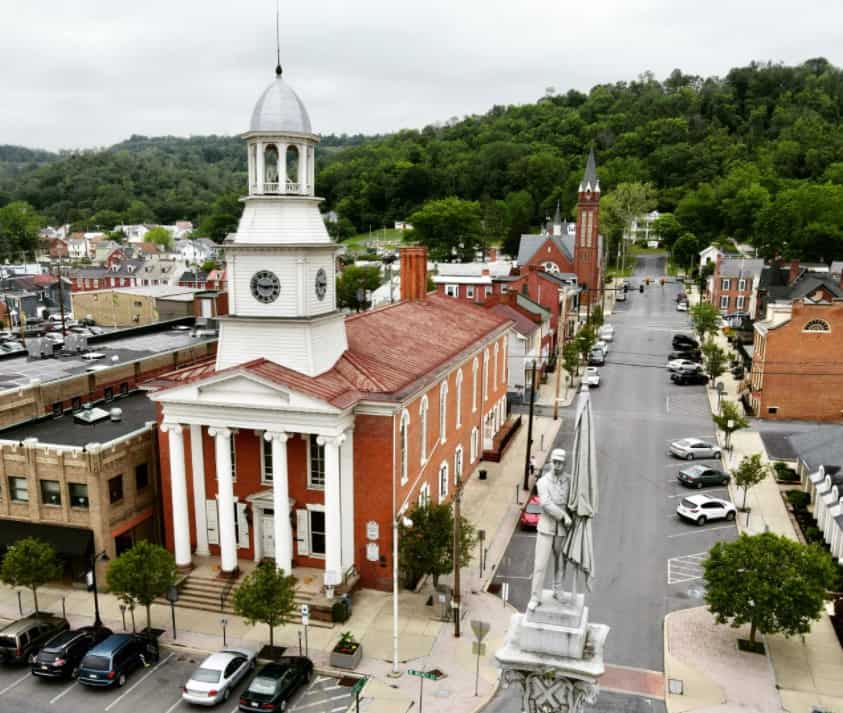
The Facebook post read like the opening of a good book: “I will be offering a free storefront for 12 months. Looking for something unique that is proven to be successful to downtown Lewistown to make it a walking town. Submit an actual business plan, not just a vision.”
But this wasn’t fiction; it was a real Facebook post from my daughter’s former basketball coach, a veteran and dad of six who has recently started investing — big time — into his hometown.
“I’ve been all over the world with the military and have seen a lot of walking towns,” Malachi Scott says. “And I thought that Lewistown could be like that, but it isn’t. A lot of times when neighborhoods and towns are gentrified, the money comes from outside investments and it makes the town unaffordable for people who were born there. I wanted to see change without pushing people out. I wanted to do what I could to make downtown Lewistown a walking town again.”
Making Lewistown a walking town and creating positive economic change without pushing people out is an admirable investment into the town’s future. Lewistown, about 30 minutes south of State College, has under 10,000 residents and a poverty level of 21% at the last census. You can see evidence of its illustrious history (and reemerging energy) in the downtown movie palace marquee and Wild Geese art installations scattered through the downtown, but as Scott says, “It’s no longer what it once was.” He says he wants to change that.
“A lot of times when neighborhoods and towns are gentrified, the money comes from outside investments and it makes the town unaffordable for people who were born there. I wanted to see change without pushing people out. I wanted to do what I could to make downtown Lewistown a walking town again.”
After leaving the military and making “some really smart investments,” Scott started working with his local VA office to build his business acumen with entrepreneurship training for veterans. He got his masters degree, tried teaching for a little while, then went back to government work in D.C. On a whim, he checked to see if there were any liquor licenses available in Lewistown. There weren’t any, but there was a bar for sale, so he applied for an SBA loan, bought it and turned it into the military and law enforcement-friendly Downrange Tavern.
And just like that, an idea was born.
He realized that he could invest in local real estate and give back to the hometown that he says gave him the push to succeed. By transforming these businesses, he could make a real impact on changing his downtown into a place where people spend time and money.
That was 2019. Today, he owns six properties, including the 73-year-old local movie theater. Which brings us to his wager to new business owners. “I want to help support other people’s ideas that would help make our downtown a walking town,” he says. “Something new and fresh — an idea that is sustainable and profitable and will help bring in more walking traffic.”
He’s asking for a complete business plan and P&L and, in exchange, will provide 12 months of free rent in a downtown storefront, where the new company will join other emerging businesses like an (awesome) bakery and sandwich place, coffee shop, ramen shop, toy store and bookstore.
“It didn’t take me long to realize what I had growing up in a small town. I knew if I ever could get back here after Sept. 11, I wanted to give back. That day changed my life and that’s why I named my holding company after that event. It made me who I am today, as did my hometown.”
“In society, we can’t create more land,” he says. “All we can do is tear stuff down to create more space. Once you start tearing down, it’s going to get worse. Instead of tearing down, we’re rebuilding.”
So why Lewistown? And why is Scott investing here when he could be investing anywhere? “I know it sounds cheesy, but there really is no place like home,” he says. “This place gave me fortitude. I’ve only gotten through what I have because of growing up here.”
“It didn’t take me long to realize what I had growing up in a small town. I knew if I ever could get back here after Sept. 11, I wanted to give back. That day changed my life and that’s why I named my holding company after that event. It made me who I am today, as did my hometown.”
Scott is still taking applications for his 12-month wager on the future of his hometown. You can submit a business plan to owner@september11thholdingcompany.com.
And as for the results? We can’t wait to read the next chapter.
Cara Aungst writes about industry, innovation and how Happy Valley ideas change the world. She can be reached with story ideas and comments at Cara@AffinityConnection.com.

